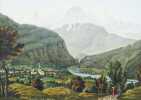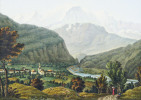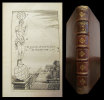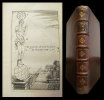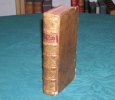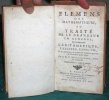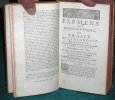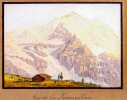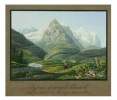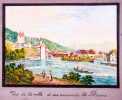796 books for « p lamy »Edit
-
Type
Book (689)
Magazine (1)
Music sheets (104)
Photographs (2)
-
Latest
Last 24h (2)
Last month (5)
Last week (2)
-
Century
17th (7)
18th (10)
19th (90)
20th (339)
21st (60)
-
Countries
Belgium (38)
Brazil (1)
Canada (17)
Côte d'Ivoire (1)
Denmark (4)
France (671)
Germany (1)
Spain (1)
Switzerland (62)
-
Syndicate
ALAC (14)
CLAQ (5)
ILAB (318)
NVVA (24)
SLACES (24)
SLAM (273)
SNCAO (1)
Topics
- Administration (3)
- Alps (6)
- Anatomy (3)
- Antwerp (4)
- Aquitaine (8)
- Architecture (5)
- Auvergne (3)
- Bard (3)
- Biography (13)
- Bourbonnais (6)
- Calvet j (10)
- Canada (3)
- Catholicism (6)
- Chemistry (4)
- Children’s books (6)
- Christ (the) (5)
- Christianity (8)
- Cinema (17)
- Circus (3)
- Colette (5)
- Comic strip (5)
- Cooking (3)
- Dedication (7)
- Dictionaries (6)
- Diseases (3)
- Ecology (6)
- Economics (5)
- Education (7)
- Education - morals (4)
- Engraving (books about) (9)
- Essays (3)
- Exhibition (3)
- Feminism (3)
- First edition (6)
- Florence (7)
- Genealogy (4)
- Genetics (6)
- Geography (11)
- Hebraic literature (3)
- Helvética (12)
- Heredity (3)
- History (33)
- Industrial arts & crafts - fine arts (5)
- Iron (8)
- Joan of arc (2)
- Julliard (3)
- Lamy etienne (35)
- Lamy maurice (19)
- Law (4)
- Linnean society of lyons (6)
- Literature (37)
- Lyons and area (6)
- Lyons college (6)
- Lyons college pc (6)
- Lyons revue (6)
- Magazine (9)
- Marriage (3)
- Mathematics (7)
- Medicine (6)
- Middle ages (3)
- Military arts (3)
- Mountaineering climbing (10)
- Navy (4)
- Newspapers press (12)
- Normandy (5)
- Painting (4)
- Paris (11)
- Philosophy (10)
- Photography (4)
- Picardie (5)
- Poetry (4)
- Policy (6)
- Professions guilds (3)
- Psychology (4)
- Quebec (6)
- Reading vocabulary (9)
- Regionalism (11)
- Reims (2)
- Religions (17)
- Reviews (9)
- Sahara (3)
- Sciences (13)
- Scores (103)
- Sociology (4)
- Songs (98)
- Sudan (3)
- Switzerland (3)
- Tea (3)
- Teaching (6)
- Theology (5)
- Trade (5)
- Travel (5)
- Various (9)
- Waltz (7)
- War (3)
- Women (the) (6)
Les jumeaux.
Paris, Éditions Corrêa & Cie, 1949 ; in-8 (144 x 194 mm), 192 pp., broché, couverture illustrée (dos légèrement décollé du volume). Collection «les Grandes Découvertes scientifiques», dirigée par Jean Bernard. L'auteur est professeur agrégé à la Faculté de Médecine de Paris.
De l'Existence d'un nouveau Métal. le Thallium. (+) Rapport fait à l'Academie des Sciences sur un Mémoire de K. Lamy relatif au Thallium. Commisaires Pelouze, H. Sainte-Claire, Dumas rapporteur. (+ regnault:) Sur la Chaleur specifique de Thallium. ...
Paris, Victor Masson et Fils, Imprimerie Gauthier-Villars, 1863. Without wrappers. In ""Annales de Chimie et de Physique"", Troisieme Series - Tome 67, Cahier Avril. Titlepage to tome 68. Pp. 385- 512 pp. and 1 folded colour plate (Spectre solaire, Spectre Thallium, showing the green line). (The entire issue offered). The papers on Thallium: pp. 385-434. Smal, stamps on verso of titlepage. Lamy's paper: pp. 383-417.
William Crookes was the first to observe Thallium (1861) as he found a new green line in a selenium sample, but Lamy was the first to isolate it and to prove that it was a metal (1862). The paper offered is Lamy's full description of his discovery, a shorter announcement was published in ""Comptes rendus"", 23 June 1862.Claude-Auguste Lamy (1820-1878) examined some slime from a sulfuric acid plant at Loos which was using Belgian pyrite and observed the green spectral line. He extracted thallium sesquichloride and isolated the metal new by electrolysis. Only after his discovery, he found out that Crookes had earlier discovered and named the new element, and gave Crookes the honour. Crookes presumed that his Thallium was something of the order of Sulphur, Selenium or Tellurium but Lamy found it to be a metal. In April 1862 he reported to the French Académie des sciences. (Timeline of chemical elements).
De l'existance d'un nouveau métal, le thallium.
(Paris, Mallet-Bachelier), 1862. 4to. No wrappers. In: ""Comptes rendus hebdomadaires des séances de l’Académie des sciences"", Vol. 54, No 24. Pp. (1237-) 1287. (Entire issues offered). Lamy's paper: pp. 1255-1258.
First appearance of the paper in which Lamy reported the first isolation of the new element Thallium. A large paper on the isolation was published in ""Annales de Chimie et de Physique"" a year after (1863). William Crookes was the first to observe Thallium (1861) as he found a new green line in a selenium sample, but Lamy was the first to isolate it and to prove that it was a metal.""Claude-Auguste Lamy (1820-1878) examined some slime from a sulfuric acid plant at Loos which was using Belgian pyrite and observed the green spectral line. He extracted thallium sesquichloride and isolated the metal new by electrolysis. Only after his discovery, he found out that Crookes had earlier discovered and named the new element, and gave Crookes the honour. Crookes presumed that his Thallium was something of the order of Sulphur, Selenium or Tellurium but Lamy found it to be a metal. In April 1862 he reported to the French Académie des sciences."" (Timeline of chemical elements).Parkinson ""Breakthroughs"", 1862 C - Weeks pp. 192 ff.
Partition de la chanson : Vous pleurez, ma jolie Poésie
Smyth 1920 approx.
Etat moyen Petit format
Vue de l’Entrée dans la Vallée de Chamouni et du Dome du Gouté. (Mont-Blanc).
Publié pr. J. P. Lamy à Berne, Lausanne & Genève, s.d., ca. 1830, 25.2x32.6 cm la feuille (11.7x16.5 cm l’image), aquatinte coloriée à la main (gouachée), encadrement au trait noir, sur papier gris/noir / Kolorierte Aquatinta mit gouchiertem Blattrand. En bas de la feuille tampon (stamp:) ‘deposé’ & ‘Proprieté de J. P. Lamy’. En bas à gauche de la feuille un num. ms. ‘162’ (stocknumber ?), 1 feuille sous passepartout.
Johann Peter Lamy was active in Geneva ca. 1791-1838 as a specialist publisher of Swiss Alpine views; little is known of Grundmann, the artist and probably Lamy’s employee. He may have been Swiss, or from Courmayeur. This aquatint is from a set of publisher’s samples of Alpine views, largely around the Chain of Mont Blanc, originally taken round the countryside by a salesman to show potential buyers, hence the colouring and finishing are exceptionally fine and of the highest quality. Image disp.

(SLACES, NVVA)
Phone number : 41 (0)26 3223808
Traité de perspective, Où sont contenus les fondemens de la Peinture.
1701 In-8, plein veau moucheté de l'époque, dos à 5 nerfs orné de compartiments dorés, pièce de titre de maroquin bordeaux, roulette sur les coupes, tranches mouchetées (traces de restauration ancienne aux mors et coif.), xxj, (3), 227, (9) p., 62 figures dans le texte dont 4 à pleine page, 8 planches hors texte dont une dépliante. Paris, Anisson, Directeur de l'Imprimerie Royale, 1701.
Edition originale de ce traité abondamment illustré, dédié "aux peintres".Oratorien, cartésien rigoureux, mathématicien et physicien, le P. Lamy défend une approche scientifique de "lart de peindre".Maîtrisant parfaitement à la fois les théories scientifiques et picturales de son temps, lauteur établit des liens entre les deux disciplines et intègre la méthode dexposition du savoir élaborée dans ses travaux scientifiques et rhétoriques."Tableau saisissant des préoccupations scientifiques, philosophiques et esthétiques de la fin du XVIIe et des débuts du XVIIIe" (cf. R. Lyndia, Bernard Lamy, in Dix-Septième siècle, 2002/1, n°214, p. 137-153).(DSB, VII, 611. Girbal, 'Lamy', p. 133. Vagneiti, 'De naturali et artificiali perspectiva, bibliografia ragionata', E4 B1).Bon exemplaire, relié à l'époque, assez grand de marges.


Phone number : 33 01 47 07 40 60
Global History of Techniques. (Nineteenth to Twenty-First Centuries)
, Brepols, 2024 Hardback, 781 pages, Size:178 x 254 mm, Illustrations:37 b/w, Language: English. ISBN 9782503591513.
Summary It is impossible to understand societies without looking at their technological underpinnings. Technology constitutes the very fabric of societies' political, economic, cultural, and everyday realities. Building on recent historiography, this book offers the first overview of the global history of contemporary technology. Gathering more than fifty specialists of the history of technology, the collection of essays presents an overview of technological evolutions on a global scale. The book challenges both teleological approaches on progress and eurocentric perspectives. It explores the complex socio-economic implications of ?techniques' (and not simply technology) as well as the systems of representation and power structures that led to the emergence of today's world. The purpose of the collected essays is to offer a new history of technology. In this perspective, a central question concerns the very category of the history of technology, i.e. the term ?technology' itself. Refusing both the limitations of ?technology' and of ?useful knowledge', the book stresses the necessity to study technology as embodying human activity as a whole. In that sense, history of technology, envisioned as techniques rather than purely technologies, is intrinsically linked to anthropology and ethnology. This book is divided into three sections. The first section opens with a world tour of techniques, restoring the complexity of regional historiographies and of the meanings given to technological activities in different societies. The second part focuses on sectors of activity, processes, and products with a strong emphasis on means of production and communication, the exploitation of natural resources, major technological systems, infrastructures and networks. The final section provides access to major cross-related issues. It pays particular attention to the role played by technology/techniques in the process of globalization, particularly through colonization, imperialism, and the development of large technological systems. TABLE OF CONTENTS Global History of Techniques, Globalization of the History of Techniques, by Guillaume Carnino, Liliane Hilaire-P rez, J r me Lamy Part 1: Techniques Across the World Introduction, by Liliane Hilaire-P rez From the ?Stone Age' to the Digital Era: Techniques in Oceania, a Brief Historiography (19th-21st centuries), by Marie Durand The Middle East in the 19th and 20th centuries: At the Crossroads of Technological Continuity and Sudden Western Modernity, by Elisabeth Mortier Integration Process of Science and Technology, between Dependence and the Desire to Innovate: the Case of Maghreb, by Yamina Bettahar Technology and Modernisation in East Asia: What Dragons Can Teach us about Global History, by Francesca Bray, Alexandra Kobiljski Framing the History of Technology in India: From the Colonial Era to the Digital Age, by Dhruv Raina, Om Prasad, Nayani Sarma African Technological Pasts since 1800, by Joshua Grace Central European Historical Writing on Technology, from 1945 to the Present Day: Institutional Contexts and Directions of Research, by Jawad Daheur Unpacking ?Eurocentric' Technology Discourses ?Back Home': Technology and Societal Challenges in Western Europe, by Erik van der Vleuten The Russian Empire, the Soviet Union and Post-socialist Russia, 19th century-early 21st century, by Elena Kochetkova, Julia Obertreis Technology in North America: Nation Building, Industrialization, and Technoscience, by J r me Baudry Latin America in the Global History of Technology, by David Pretel Part 2: Artefacts, Processes, Sectors Introduction, by Guillaume Carnino Technology and its Temporalities, a Global Perspective, by Jonas van der Straeten, Heike Waltraud Weber Mining and Extractive Industries: Prospecting, Extracting, And Post-mining Techniques in the Anthropocene Era, by Kevin Troch Heavy Industries, from Steel and Molecules to the Cloud, by Florence Hachez-Leroy Energy in the History of Technology, by Mahdi Khelfaoui, Ana l Marrec Aeronautics and Aerospace: Globalization and Technical Junctions, by J r me Lamy, Arnaud Saint-Martin Mobility Techniques: Objects and Supports of Transfers, by Arnaud Passalacqua Sailing and Fishing: when Technical Innovation Reshaped the Seas, by G raldine Barron, Julia Lajus Water Harnessed by Industry: Hydraulic Technology in the Nineteenth and Twentieth Centuries, by Rapha l Morera, Elisabeth Mortier Food Technology: Food Preservation, Packaging and Transport, by Ludovic Laloux Four Examples of Transformations of Agricultural Techniques from the 19th to the Beginning of the 21st century, by Fabien Knittel Electrifying Information: Global Telecommunication Technologies 19th-21st centuries, by Vincent Kuitenbrouwer From Calculators to Datacenters: History of Industrial Computing and Quantification, by Guillaume Carnino From Banking Computerization to Fintech: The Digital Revolution in Banking (1950s-1990s), by Sabine Effosse, Laure Quennouelle-Corre Two Centuries of Technical Progress in Civil Engineering and Construction: A Few Lines of Strength, by Dominique Barjot The Factory of Desire: Textiles and Techniques (19th-21st centuries), by Audrey Millet Part 3: Cross-cutting Issues Introduction, by J r me Lamy Technology as a Human Science, by Liliane Hilaire-P rez Laboratory Techniques, by Joris Mercelis Big Science and Technological Transformations, by Olof Hallonsten Technique and Law, by Alessandro Nuvolari, Caterina Sganga Training and Technological Education, by St phane Lembr Prometheus Unbound: War and Technology from 1800 to Globalisation, by Patrice Bret Taylorism, by Patrick Fridenson Conflicts and Controversies over Techniques, by Fran ois Jarrige Body Techniques and the Search for Human Perfection: From the Regeneration of the Social Body to the Injunction to Surpass Oneself, by Cecilia Calheiros Thinking the Co-constitution of Gender and Technology from a Feminist Perspective, by Virginie Julliard Technologies of Art and Culture: Film and Sound, by Martine Beugnet, Mathieu Duplay A Short and Reflexive History of Everyday Life Technologies, Late 18th-21st Centuries, by Gil Bartholeyns, Manuel Charpy Technology, Pollution, and Environment, by Soraya Boudia, Nathalie Jas Repair, Recycling and Waste, by Thierry Bonnot, Michel Lett
Audrey Lamy-Dernières Avant Vegas
M6 Vidéo 2017 14x18x1cm. 2017. DVD.
French édition - DVD présentant des marques de stockage et/ou de lecture sur la couverture et/ou les pourtours mais demeurant en bon état d'ensemble.Expédition sous blister dans une enveloppe matelassée depuis la France
CARTE SOUVENIR DE LA TOUR EIFFEL - EXPOSITION UNIVERSELLE DE 1889
paris 1889 une carte souvenir, lithographiée en noir dans un encadrement beige avec un liséré blanc, format : 24 x 14,2 cm,trés légers plis aux angles en marge, P. LAMY DEL Déposé, 1889 Paris P. LAMY Editeur,
RARE CARTE SOUVENIR..................en bon état général (good condition). en bon état NOUS SOMMES EN CONGÉ DU 29 AVRIL 2025 AU 13 MAI 2025 merci de votre compréhension!
Un musicien en Voyage, Les lettres de Mendelssohn
1908 1908 Amiens, Académie des lettres, des sciences et des arts d'Amiens 1908 1 In 8 Cartonnage éditeur 54[pp]
Etat d'Usage Frais de port inclus vers France métropole au tarif normal, délai d'acheminement sous 72h, pour les commandes > à 80 euros et poids < 1kg. Disponibilité sous réserve de vente en Boutique. Frais de port inclus vers France métropole au tarif normal, délai d'acheminement sous 72h, pour les commandes > à 80 euros et poids < 1kg. Disponibilité sous réserve de vente en Boutique. Disponibilité sous réserve de vente en boutique, prix valable frais de port inclus pour commande > 90 € et poids < 1 Kg
Elemens des Mathématiques ou Traité de la Grandeur en général.
Elemens des Mathématiques ou Traité de la Grandeur en général qui comprend l'arithmétique, l'Algèbre, l'Analyse, et les principes de toutes les Sciences qui ont la Grandeur pour objet. Par le R. P. Bernard Lamy, Prêtre de l'Oratoire.Divisé en 7 Livres avec le Livre VIII : Supplément des Elemens des Mathématiques. Traité de la progression des nombres naturels & des nombres impairs. Les fondemens de l'Aritmétique des Infinis.Septième Édition, revue & corrigée. A Paris, chez Jean Hourdel - 1738 - xxij et 490 pages et Table. Les pages de 481 à 490 et celle du Privilège du Roy, sont reliées en début de volume après la préface.Reliure plein veau de l'époque. Dos à nerfs orné et doré avec pièce d titre maroquin rouge. Filet à froid encadrant les plats. Roulette dorée sur les coupes. Tranches rouges. Petite galerie de ver en pied du dos. Coiffe supérieur et coins frottés. Pas de rousseur. Bon état. Format in-12°(17x10).Bernard Lamy (1640-1715), est un mathématicien, philosophe et physicien français.
Partition de la chanson : Chien de l'aveugle (Le) Monologue comique Théâtre des Variétés,Eldorado,Théâtre des Ambassadeurs
Partitions sur les Animaux Benoit Emile 1885 approx.
Bon état Petit format
Les Applications de la génétique à la médecine : Par Maurice Lamy
Générique Broché D'occasion bon état 01/01/1943 150 pages
Sérafini J. Brillet Gaston Lamy Frédéric-Edouard-Camille
Reference : 24030VPPG
ISBN : B0016W5N0I
Mon Evangile : Selon saint Jean. Lettres-préfaces du... cardinal Verdier ... du... cardinal Sérafini ... et de... Mgr Lamy ... Introduction de G. Brillet
Générique Broché D'occasion état correct 01/01/1943 150 pages
Sérafini J. Brillet Gaston Lamy Frédéric-Edouard-Camille
Reference : 25831VPED
ISBN : B0016W5N0I
Mon Evangile : Selon saint Jean. Lettres-préfaces du... cardinal Verdier ... du... cardinal Sérafini ... et de... Mgr Lamy ... Introduction de G. Brillet
Générique Broché D'occasion état correct 01/01/1943 150 pages
Fontaine Médicis.
, , 1890 ca. Aquarelle sur carton signée en bas à droite (47,5 x 29,5 cm).
Vue de biais de la fontaine Médicis du Jardin du Luxembourg à Paris où l'on reconnaît Polyphème surprenant Galatée dans les bras d'Acis, la sculpture d'Auguste Ottin.Pierre Désiré Eugène Franc, dit Franc-Lamy (Clermont-Ferrand, 1855 - Paris, 1919) s'inscrit dans le courant pré-impressionniste. Il fut l'élève de Pils et de Gérôme aux Beaux-Arts et rejoignit le groupe des peintres qui fréquentaient la Nouvelle-Athènes et la boutique du peintre et pâtissier Muret. Il fut l'ami d'écrivains comme Mallarmé et Villiers de l'Isle-Adam (son dessin de Villiers sur son lit de mort fut reproduit en frontispice de la troisième édition d'Ellen). Il illustra des poésies de Cros et de Richepin. Franc-Lamy fonda avec plusieurs de ses compatriotes auvergnats une société à vocation culturelle, la Soupe au choux (dont il trouva le nom) ; elle organisait chaque année de 1885 à 1914 un salon d'art auvergnat.
L'armée et la démocratie (3eme édition)
Calmann-Lévy Malicorne sur Sarthe, 72, Pays de la Loire, France 1887 Book condition, Etat : Bon broché, sous couverture imprimée éditeur blanche In-8 1 vol. - 227 pages
3eme édition Contents, Chapitres : 1. Le service de trois ans : La loi de 1872 - Le service de 3 ans - L'armée active - Les réserves - L'armée coloniale - Conséquences financières - Conséquences sociales et militaires - 2. Le service de cinq ans, le remplacement : De l'instruction militaire - De l'éducation militaire - De la durée du service - Nécessité du remplacement - Conséquences militaires - Conséquences sociales - Conclusions - Étienne Lamy, né à Cize (Jura) le 2 juin 1845 et mort à Paris le 9 janvier 1919, est un avocat, journaliste et homme politique français, secrétaire perpétuel de lAcadémie française. - Député du Jura à lâge de 26 ans en 1871, il est à la fois républicain et catholique. Réélu en 1876 et 1877, il est battu en 1881 par un candidat radical et anticlérical. Il se retire alors de la politique active et devient essayiste, mais se présente à nouveau, dans le Morbihan, aux législatives de 1893. Il est alors élu, grâce à l'apport de voix royalistes opposées à l'élection du rallié Albert de Mun. Il est élu membre de lAcadémie française en 1905, et en devient secrétaire perpétuel le 13 mars 1913. (source : Wikipedia) signature ancienne de l'ancien propriétaire sur le bord gauche du plat supérieur de la couverture, legeres petites taches sur le coin inférieur droit de la couverture, sinon bon état, intérieur frais et propre, cela reste un bon exemplaire - nb : anonyme (pas de nom d'auteur), il s'agit d'un texte d'Etienne Lamy, 1845-1919, selons nos sources
Alex Katz. (Exhibition catalogue).
.: 2. Paris, Galerie Marguerite Lamy, 1975, oblong in-8°, 17 pp, 13 full-page bl/wh. and colour ills. Publisher's printed cover, stapled.Text in English. Added are 7 loose typed A4 pages in French, covering the exhibitions held in 1974 (Galerie Marguerite Lamy) and 1973 (Seattle Art Pavilion) and a conversation with the artist. The present exhibition was held at the Marguerite Lamy Gallery in May - June 1975. This American Pop artist was born in New York, 1927..
Jean de grouchy L'homme et l'héréditéhachette les Gds Problèmes
Les Editions de l'Homme 1967 1967. Maurice Lamy & Jean de Grouchy: L'homme et l'hérédité/ Hachette-Les Grands Problèmes 1967 . Maurice Lamy & Jean de Grouchy: L'homme et l'hérédité/ Hachette-Les Grands Problèmes 1967
Très bon état
Vue de la Joungfrau sur la Wengen-Alp Canton de Berne.
Publié par J. P. Lamy à Basle, Berne & Genève, 1830, 12.5x16.5 cm. gravure aquarellée / Kolorierte Aquatinta, guachiertem Blattrand, unten am Blattrand gedruckt: ‘Deposé’ & ‘Propriété de J. P. Lamy’, 1 feuille (num. n° 179) / 1 Blatt. (20x24), passepartout.
Image disp.

(SLACES, NVVA)
Phone number : 41 (0)26 3223808
SCHILLBACH Pinxit (SCHILBACH, Johann Heinrich) - (LAMY, J. P.):
Reference : 102588aaf
Passage du grand Scheideck entre Grindelwald et Meiringen, Canton de Berne. (Links unten Signiert ‘Schillbach pin:’).
Publié pr. J. P. Lamy, à Basle, Berne, Lausanne, Genève, s.d., vers 1825, 12 x 16 cm (lîmage), aquatinte coloriée à la main (gouachée), encadrement au trait noir, sur papier gris/noir / Kolorierte Aquatinta mit guachiertem Blattrand, 1 feuille (18.5x20.5 cm).
Hohe Beachtung fand Schilbach’s reichhaltiges Werk als Schöpfer von Landschaftsansichten, die neben Ölbilder auf ausgedehnten Reisen durch Europa entstanden. In der Schweiz arbeitete er zeitweise für den Verleger Johann Peter Lamy, der ihm gezielte Aufträge erteilte. Von diesem wurden unter anderem Schilbachs grossartige Ansichten der Stadt Thun veröffentlicht und in den Handel gebracht. (M. Krebser). cf. Markus Krebser: Thun und seine Landschaft S. 107. (Johann Heinrich Schilbach: Maler und Kupferstecher der Deutschen Schule 1798 - 1858); Benezit (englische Ausgabe - 2006) vol 16, p. 616. Image disp.

(SLACES, NVVA)
Phone number : 41 (0)26 3223808
Vue de la Ville et des environs de Thoune (THUN) Canton de Berne.
Verlagsangaben übermalt (Berne, Basle & Genève, J.P. Lamy), o.J. um 1825-30, 11.5x16 cm (Bild), (Leuchtend) kolorierte Aquatinta. Mit gouachiertem Blattrand, 1 Blatt (19x 22.3 cm)
Johann Peter Lamy. Maler, Kunsthändler und Verleger in Bern, führte dort einige Jahre ein Geschäft mit Kupferstichen (ca.1791 bis 1839). Sein erfolgreiches Wirken als Händler, Verleger und Kunstschaffender führte dazu, dass er in der Folge weitere Geschäfte in Basel, später in Genf und schliesslich noch in Lausanne eröffnete. Seine Bilder besitzen in der Regel leuchtendes Kolorit. M. Krebser: Thun und seine Landschaft n° 365. (Grösse: 11.3x14.8). Image disp.

(SLACES, NVVA)
Phone number : 41 (0)26 3223808
Femme (La) de demain.
Londres, J.M. Dent and Sons ; Paris, Georges Crès et Cie, sans date (circa 1900) ; in-12, demi-basane havane, auteur et titre dorés, dos à nerfs, filets dorés et motifs décoratifs à froid ; (2) ff. , VI , 205, (3) pp. ; photographie noir et blanc en frontispice de Etienne Lamy.
Exemplaire en très bon état malgré quelques petits frottements au dos et sur les charnières.


Phone number : 06 60 22 21 35
Lamy droit économique concurrence distribution consommation
Lamy 1992 in4. 1992. Cartonné.
Bon Etat qlq traces et taches
 Write to the booksellers
Write to the booksellers![Les jumeaux. . [MEDECINE] - LAMY (Maurice)](https://static.livre-rare-book.com/pictures/OEC/_202000230_1_thumb.jpg)
![Les jumeaux. . [MEDECINE] - LAMY (Maurice)](https://static.livre-rare-book.com/pictures/OEC/_202000230_2_thumb.jpg)
![Les jumeaux. . [MEDECINE] - LAMY (Maurice)](https://static.livre-rare-book.com/pictures/OEC/_202000230_3_thumb.jpg)

